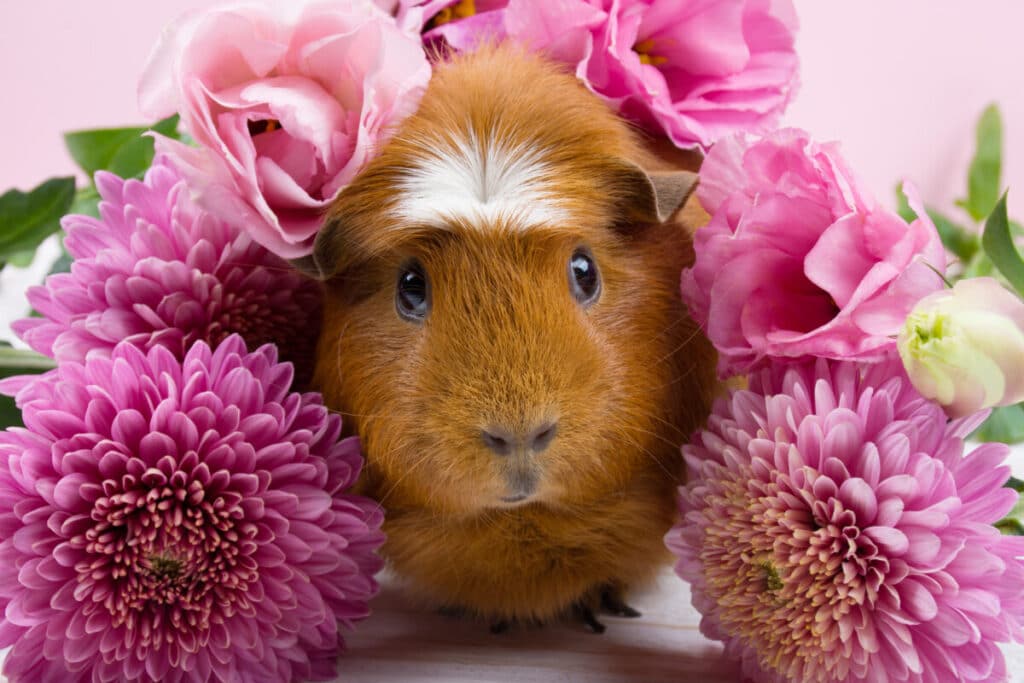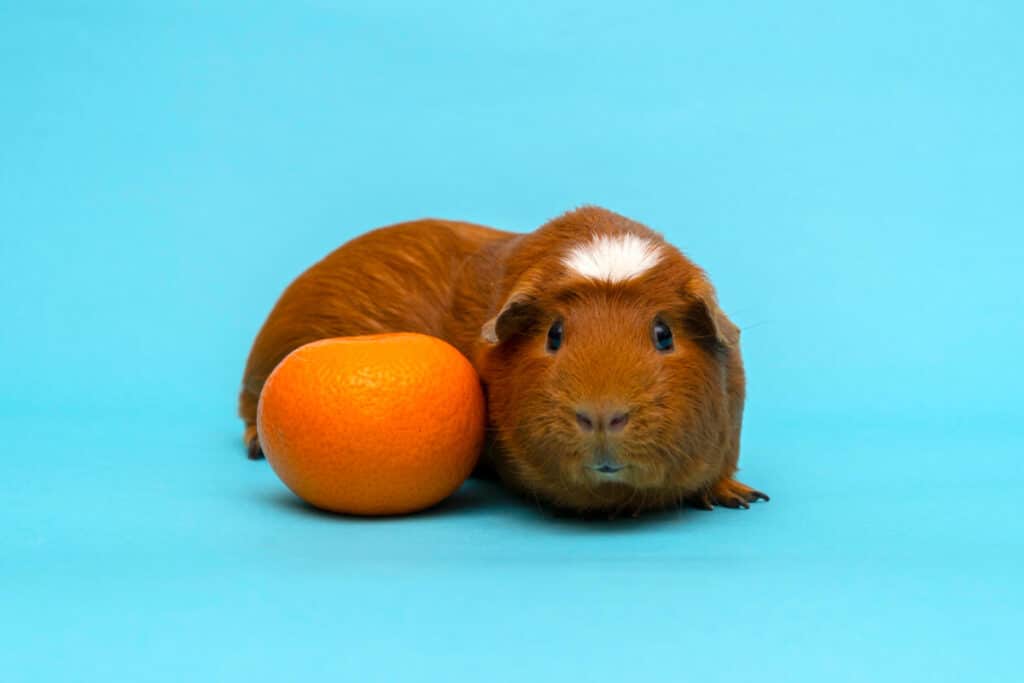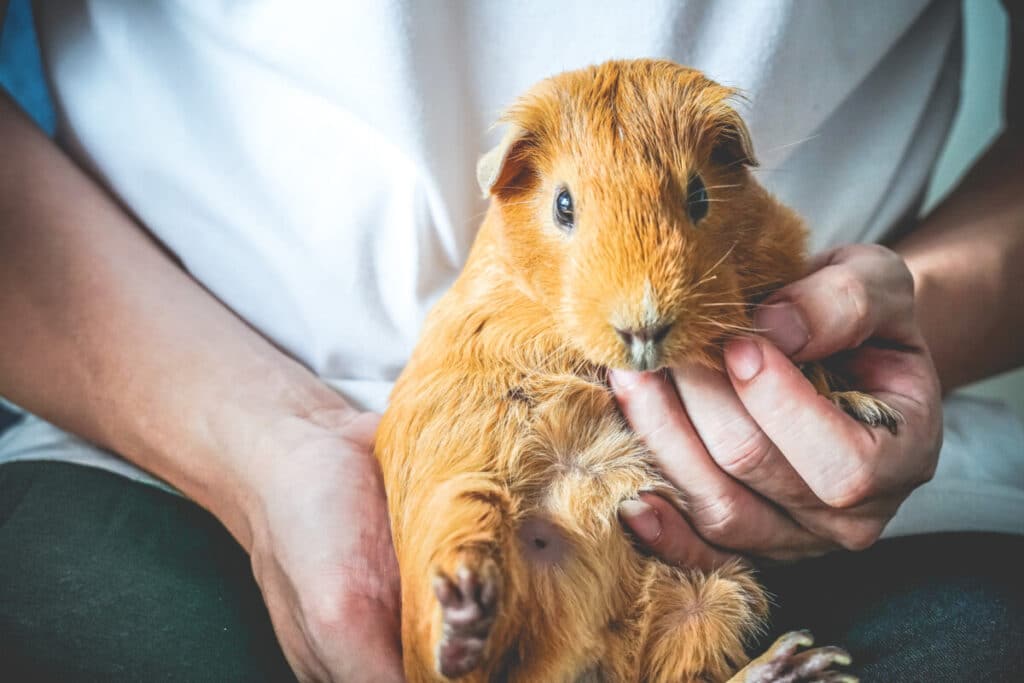
Guinea pigs are some of the sweetest pets out there, and they certainly deserve all the love and kindness that we can give them. This is especially true at the end of their lives.
Guinea pigs are very social animals and don’t want to be alone when they die. The best way to support a dying piggy is to spend time with them, petting them, talking to them, and generally making sure they’re comfortable. This will help them stay happy in their last moments.
Leaving your guinea pigs totally alone while they’re dying will put them in distress, but there are specific steps that you’ll want to take to keep them happy beyond simply being there for them.
Why Do Guinea Pigs Need Companionship?
Guinea pigs are highly social herd animals like sheep or goats. This means that they need to have friends nearby in order to be happy. You probably already know that you should never keep just one guinea pig since they can get very lonely very easily.
You have probably also gathered by now that guinea pigs are social with humans and other animals that show them affection as well. While having people around isn’t a replacement for other guinea pigs, they appreciate their caretakers and are comforted by their presence.
When guinea pigs are dying, they don’t stop being social animals. If you isolate your piggy suddenly it can put them into a lot of undue distress. Because of this, even though you might need to take it out of its enclosure depending on the circumstances, you should still stay with the animal for as long as it seems to need you.
Like most animals, guinea pigs often get scared while they’re dying, and having familiar faces around them can really help them stay brave.
How To Tell if You Need to Isolate Your Guinea Pig
In most circumstances, it’s best to keep your dying pet with its friends, but there are definitely some circumstances where it’s best to separate it from the others either for its protection or theirs.
If you have several guinea pigs, they may engage in aggressive bullying behaviors such as pushing or nipping. While this is fairly normal for guinea pigs, a sick or dying animal can easily fall victim to excessive meanness. In this situation, it’s best to move the dying animal to a different enclosure so that it doesn’t get bullied by the others.
The other situation where you’ll want to move your dying pet out alone is if it has an infection that could potentially spread to the others. If this is the case, it can be hazardous to keep the sick pet with its companions. Fortunately, you can still be there for your friend, as most guinea pig diseases aren’t transmissible to humans, and those that are don’t tend to be terribly severe for healthy adults.
You also don’t want to smother your pet during this period. If it looks like it isn’t interested in petting or cuddling, you should probably let it alone. You can keep talking to it or singing to it to show love, but you don’t want to overwhelm them in a situation that can already be very uncomfortable.
How To Comfort A Dying Guinea Pig
You can’t necessarily solve your guinea pig’s problem, but you can help them stay comfortable while they pass on.
The obvious thing to do is to keep your pet well-fed and watered. Guinea pigs need to eat and drink very often, but as they get weaker and weaker they’ll need to have someone force-feed them with a spoon or syringe. It takes a guinea pig twenty-four to seventy-two hours to die, so you won’t be doing this for too long of a time, but it will make things way more bearable for them during their last hours.
Since your pet is going to die, there’s no need to hold back on treats. While they can still eat solid foods, you should give them all their favorites. While they can still be a little active, it’s a good time to celebrate your pet’s life with them so that when they inevitably need to slow down they know that you love them.
The next thing you might think to do is give your guinea pigs some painkillers. This can help, but always make sure to consult your vet first. If you give your pet the wrong kind of medicine or the wrong dose, it can end up making things worse instead of better. Fortunately, a quick phone call should be enough to determine those things to a reasonable degree.
Many animals tend to drop in body temperature significantly while they’re dying you can alleviate this for your pet by putting a light blanket or cloth over them. This will help them retain their body heat so that they don’t feel cold. You can also alleviate this by increasing the ambient temperature in their enclosure.

Making sure your guinea pig has their favorite toy with them can also help them feel comforted. Even if they aren’t going to play with it, just having comfort objects around will help your pet feel safe.
You can also pet and cuddle your guinea pig to show love for them, but as mentioned earlier your pet is probably very tired and might even be in pain, so if they don’t seem to be appreciative of that kind of attention then you should let them alone.
They are less likely to get tired of your voice, so talking or singing to your pet in a calm reassuring manner is a good way to keep them feeling safe. Guinea pigs do not speak English, so the content of your speech is more for you than it is for them. That being said, they can recognize their names, so keep in mind that even if they don’t know what you’re saying they’ll probably know that you’re talking to them.
You probably already know whether your pet likes being sung to or not. If it does, singing to it can be a sweet way to comfort it. Guinea pigs do not have preconceived notions of musical theory, so even if you aren’t very good at singing they’ll probably still enjoy it.
Making sounds to let them know that you’re still there will keep them from getting lonely. As long as the sounds are sounds that your pets associate with love and safety it should help ease their passing even when there’s not much else for you to do.
If you’re moving them to a new enclosure, you can make that transition easier for them by giving them plenty of soft hay to nestle in and a lot of space to move around if they want to. Dying guinea pigs tend to get slow and lethargic, but they’ll still appreciate having plenty of space around them.
How To Tell if Your Guinea Pig is Dying
If your guinea pig is experiencing any of the symptoms discussed in the following section, then you should take them to a vet immediately. It only takes a few days for illness to become fatal in animals as small as guinea pigs are, and some of these symptoms can be stopped if they’re caught early enough.
Behavior Changes
If your pet goes through extreme behavior changes very quickly this can be a sign of serious illness. This can take the form of hiding, depression, cessation of grooming behaviors, or avoiding companions.
This may also manifest in increased lethargy, which is often an indicator of a potentially fatal sickness in guinea pigs. While any kind of major behavioral change in a guinea pig is a good reason for a trip to the vet, this is especially important to look out for.
Flies Around The Enclosure
Myiasis, a bacterial skin infection that makes guinea pigs vulnerable to fly larvae, is a potentially fatal condition caused by an abundance of urine and feces in the guinea pig’s space and on their skin. This can be exasperated if the interior of the enclosure is especially humid.
The specifics of this disease are upsetting to discuss. Suffice it to say that if you find maggots on your guinea pig or flies in their enclosure they should be taken to the vet immediately for treatment.
However, even if you catch this condition early enough that it can be cured, it is possible that the root cause of the disease, which is a lapse in personal grooming, is emblematic of some other problem, meaning that a guinea pig who has been sick with myiasis should be watched carefully to ensure that they’re getting clean.
Changes in Vital Signs

A distinct spike or drop in temperature, increase or decrease in heart rate, or slowing of capillary refill time are all clear signs that your friend is getting ready to move on.
You can measure your pet’s temperature with a thermometer. A normal temperature for guinea pigs is 102 to 104 degrees Fahrenheit. Like with humans, a little variation in temperature can be explained by humidity, ambient temperature, diet, and a number of other factors that are difficult to track. However, anything beyond a few degrees in either direction is cause for worry.
Measuring heart rate is fairly easy. Find your pet’s pulse and then count how many times their heart beats in a given time, scaling that up to beats per minute if you don’t want to count for an entire minute. The normal bpm for a guinea pig is 200 to 250.
Capillary refill time is the amount of time that it takes for color to return to a capillary bed after it has been blanched because of pressure. To measure this in a guinea pig, simply open your pet’s mouth and gently press on its gums around its teeth. When you let go, count how long it takes for the color to return to the gums. This should usually only be one or two seconds.
Deviations in any of these numbers can be cause for concern, and if you notice them you should take your animal to a vet to see if anything can be done.
Difficulty Breathing
Difficulty breathing can be a sign of several potential problems for a guinea pig. You can tell if your guinea pig is having respiratory problems if they are making noises while trying to breathe. Because guinea pigs only breathe through their noses, they don’t usually make loud breathing noises.
If you can hear them making an effort to breathe then they might be sick and you should take them to a vet.
Problems With Urination Or Defecation
Just like with people, if your guinea pig is pooping or peeing blood that’s a bad sign. Watery diarrhea also indicates severe problems, as do difficulties in passing fecal matter. These can indicate anything from intestinal blockages to an infection, any of which could be fatal.
Muscle Spasms
When your guinea pig starts spasming, that’s usually a sign that the end is near for them. There isn’t really much you can do in that case, although a trip to the vet may still be in order to figure out the best way to move forward.
Shivering
There are many reasons that a guinea pig might shiver. The temperature in their enclosure might just be too cold, or they might be in treatable shock. However, they might also be shivering because they’re afraid of death or because their body temperature has dropped due to illness.
This can be alleviated with a light blanket, and while it may indicate that the animal is dying it also may not.
Loss of Appetite
When guinea pigs are on their way to death they’ll often lose the will to eat. it’s normal for older guinea pigs to have a smaller appetite than they had in childhood and adolescence since they aren’t growing anymore, but if they have a very quick extreme change in appetite this can be a sign of serious illness. Even if it isn’t caused by illness, it can end up causing illness if it goes on for too long.

